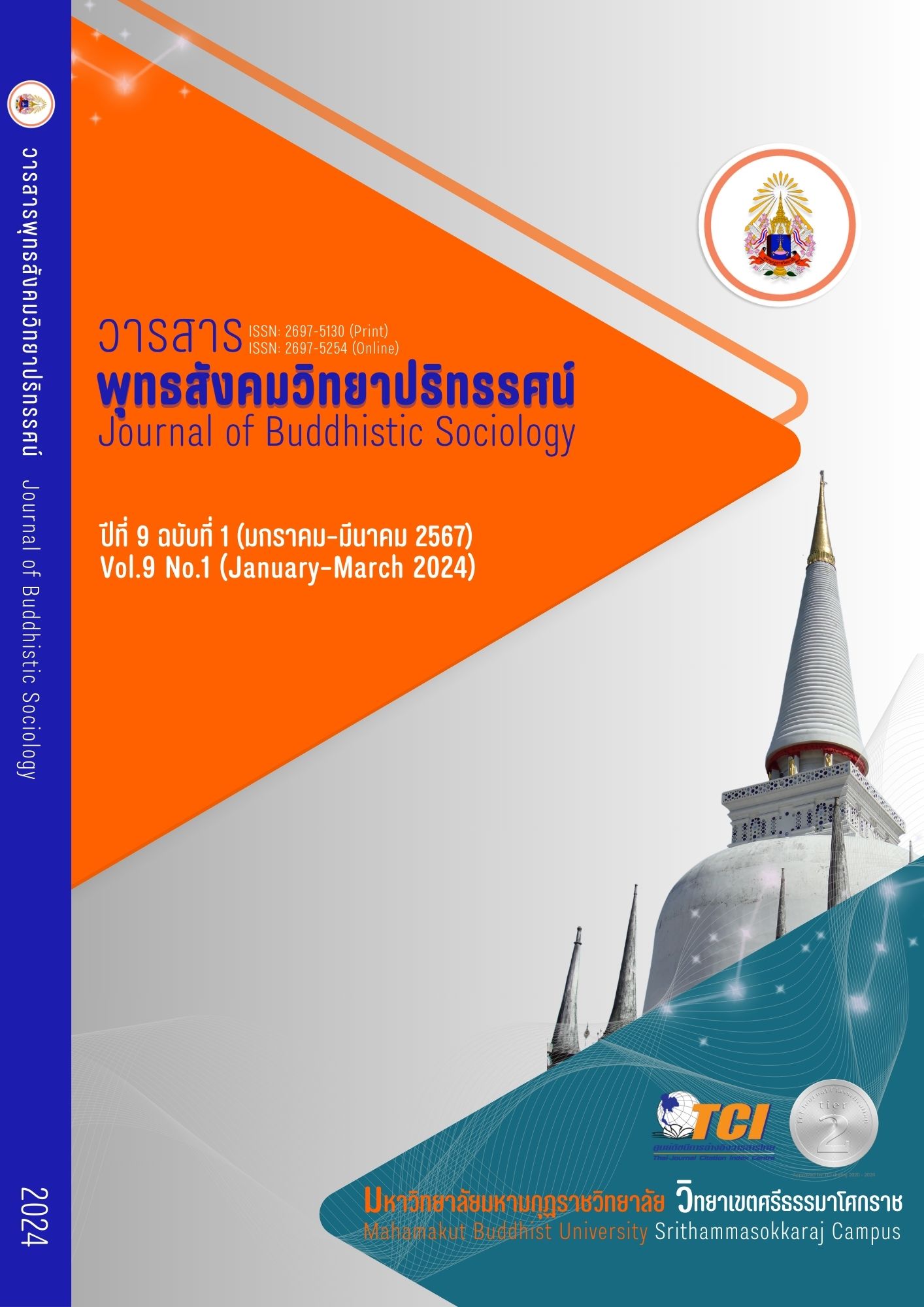THE ACADEMIC ADMINISTRATION MODEL IN TEACHING AND LEARNING MANAGEMENT FOR NEW NORMAL LIFE OF THE KRONGKANLUANGKAENOI SCHOOL, MUEANG NA SUB-DISTRICT, CHIANG DAO DISTRICT, CHIANG MAI PROVINCE
Main Article Content
Abstract
The objectives of this research were to 1) study current conditions and needs in teaching and learning management for new normal life of the Krongkanluangkaenoi School, Mueang Na Sub-district, Chiang Dao District, Chiang Mai Province, 2) find an academic administration model in teaching and learning management for new normal life, 3) experiment the academic administration model in teaching and learning management for new normal life, and 4) evaluate the experiment of academic administration model in learning and teaching management for new normal life. The research tools included document study and the Delphi technique questionnaires. Descriptive statistics used in this research were percentage, mean percentage, mean, standard deviation, and inferential statistics consisting of a Pair t-test and One Sample t-test.
The results of the study revealed that:
- For current conditions and needs in teaching and learning management for the new normal life of the Krongkanluangkaenoi School, the research found the point that should be developed as follows: Technology should be introduced to assist in teaching and learning management.
- The academic administration model in teaching and learning management for the new normal life of the Krongkanluangkaenoi school agreed upon by experts were: 1) the theory of Constructionism, 2) the CIPPA Model teaching and learning process, and 3) Information technology referring to the platform in communication technology and Computer Assisted Instruction (CAI).
- For the model experiment, the academic administration model in teaching and learning management for the new normal life was examined in real situations with target groups by integrating the learning management with a daily learning experience set operated with a quality cycle process, “PDCA.”
- For an experiment evaluation, the comparison results of the efficiency for using the academic administration model in teaching and learning management for new normal life before and after experiment using paired t-test were as follows: =1.96, S.D.=4.85, the t-test=4.68, df=134, with a statistical significance of .000, which was less than .05 (Sig. < .05), indicating that there were significant differences in mean scores at the .05 level.
Article Details

This work is licensed under a Creative Commons Attribution-NonCommercial-NoDerivatives 4.0 International License.
References
กระทรวงศึกษาธิการ. (2551). หลักสูตรแกนกลางการศึกษาขั้นฐาน พ.ศ. 2551. กรุงเทพมหานคร: โรงพิมพ์ชุมนุมการเกษตรแห่งประเทศไทย จำกัด.
ดวงฤทัย ล่องอำไพ. (2562). การสร้างบทเรียนคอมพิวเตอร์ช่วยสอน วิชาเทคโนโลยีสารสนเทศและการสื่อสาร เรื่องข้อมูลและการทำงานของระบบคอมพิวเตอร์ของนักเรียนชั้น ประถมศึกษาปีที่ 5. ใน สารนิพนธ์ปริญญามหาบัณฑิต. มหาวิทยาลัยนอร์ทกรุงเทพ.
นิตยา พงษ์เกษม. (2559). ความพึงพอใจของครูที่มีต่อการบริหารวิชาการโรงเรียนบ้านเนินพลับหวาน สังกัดสำนักงานเขตพื้นที่การศึกษาประถมศึกษาชลบุรี เขต 3. ใน งานนิพนธ์การศึกษามหาบัณฑิต สาขาวิชาการบริหารการศึกษา. มหาวิทยาลัยบูรพา.
พระราชบัญญัติการศึกษาแห่งชาติ พ.ศ. 2542. (2542, 19 สิงหาคม). ราชกิจจานุเบกษา. เล่ม 116 ตอนที่ 74 ก. หน้า 18.
มนต์ชัย เทียนทอง. (2548). สถิติและวิธีการวิจัยทางเทคโนโลยีสารสนเทศ. กรุงเทพมหานคร: สถาบันเทคโนโลยีพระจอมเกล้าพระนครเหนือ.
รุ่งฤดี นนทภา. (2560). การพัฒนารูปแบบการบริหารงานวิชาการด้านการจัดการเรียนการสอนโรงเรียนเทศบาล 1 กาฬสินธุ์พิทยาสิทธิ์. ใน วิทยานิพนธ์ครุศาสตรมหาบัณฑิต การบริหารจัดการศึกษา. มหาวิทยาลัยราชภัฎสารคาม.
วรนิษฐา คำยศ. (2564). รูปแบบการบริหารงานวิชาการด้วย 3P-R Model ของโรงเรียนชุมชนบ้านทุ่ง (อินมีอุปถัมภ์). วารสารครุทรรศน์ (Online) มหาวิทยาลัยราชภัฏอุบลราชธานี, 1(2), 31-51.
วิทยา วาโย และคณะ. (2563). การเรียนการสอนแบบออนไลน์ภายใต้สถานการณ์แพร่ระบาดของไวรัส COVID-19: แนวคิดและการประยุกต์ใช้จัดการเรียนการสอน. วารสารศูนย์อนามัยที่ 9, 14(34), 285-298.
วิภวานี ชาญวิรัตน์. (2560). ผลการจัดการเรียนรู้โดยใช้บทเรียนคอมพิวเตอร์ช่วยสอนร่วมกับการจัดการเรียนรู้แบบร่วมมือเทคนิคกลุ่มแข่งขัน กลุ่มสาระการเรียนรู้การงานอาชีพและเทคโนโลยีสำหรับนักเรียนชั้นประถมศึกษาปีที่ 4. ใน วิทยานิพนธ์การศึกษามหาบัณฑิต สาขาวิชาหลักสูตรและการสอน. มหาวิทยาลัยบูรพา .
สำนักงานพัฒนารัฐบาลดิจิทัล. (2564). การใช้งานเทคโนโลยี Blockchain สำหรับภาครัฐ (Blockchain for Government Services) (พิมพ์ครั้งที่ 2). กรุงเทพมหานคร: สำนักงานพัฒนารัฐบาลดิจิทัล (องค์กรมหาชน).


